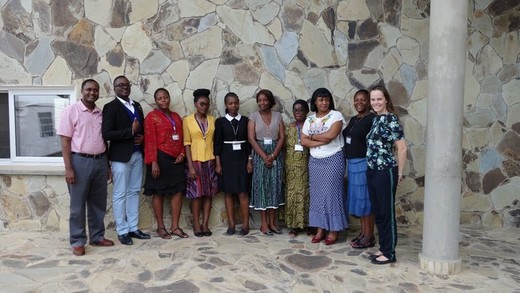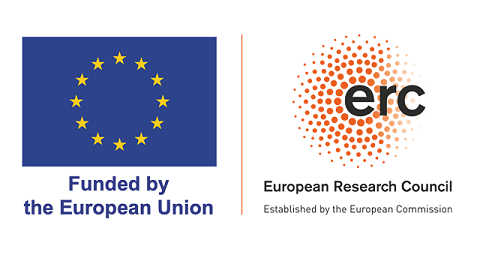IPV_Tanzania
Investigating the predictors and consequences of intimate partner violence: a mixed methods study in Mwanza, Tanzania.
The study, funded by the European Research Council Starting Grant IPV-Tanzania is conducted in collaboration with the Mwanza Intervention Trials Unit, consists of four components:
1. A four-wave longitudinal study on intimate partner violence among approximately 1000 women
2. A cross-sectional study of approximately 1000 young men aged 18 to 24 years
3. In-depth interviews with women who experienced intimate partner violence
4. In-depth interviews with men, including photovoice

Picture 1: Team at the Mwanza Intervention Trials Unit
This study is one of the largest quantitative and qualitative longitudinal studies on intimate partner violence with multiple time points among women of reproductive age in a low-income country. Applying a holistic approach, the study is not limited to information from woman only, it will also interview men qualitatively and quantitatively on their perceptions, predictors and consequences of intimate partner violence.
Objectives
The primary objective of the study will be to investigate the predictors and consequences of intimate partner violence in Tanzania over time, focusing specifically on women’s economic empowerment, poor mental health and alcohol abuse as predictors and consequences of intimate partner violence.
The specific aims of the study are:
1. To map out the changes in the incidence and intensity of physical and/or sexual intimate partner violence over time and to explore overlaps with and changes in emotional and economic abuse and controlling behaviour.
2. Investigate how changes in the incidence and intensity of intimate partner violence impact alcohol abuse, poor mental health and women’s empowerment over time, with a special focus on the interactions between intimate partner violence and stressors and benefits of participation in microfinance loan groups.
3. Explore the effect of cumulative intimate partner violence at all time points on women’s mental health, alcohol abuse and economic empowerment.
4. Establish the pathways though which the selected indicators lead to intimate partner violence and vice versa.
5. Explore the mediators that influence the relationship between intimate partner violence and women’s mental health, alcohol abuse and economic empowerment.
As most theories on intimate partner violence originate from high income countries, this study has the strong potential to have a long-lasting impact on shaping the research agenda on intimate partner violence. It is of immediate necessity to address a vital public health challenge of our time.

Picture 2: Home utensils, the participants took this picture as a memory of what happened in previous months (Photovoice)
Funding

This project has received funding from the European Research Council (ERC) under the European Union’s Horizon 2020 research and innovation programme (grant agreement No. 716458).
Funded by the European Union. Views and opinions expressed are however those of the author(s) only and do not necessarily reflect those of the European Union or the European Research Council Executive Agency. Neither the European Union nor the granting authority can be held responsible for them.
Publications
2024
- Aloyce D, Stöckl H, Mosha N, Malibwa D, Sichalwe S, Hashim R, Ayieko P, Kapiga S, Mshana G. 2024 Depression, suicidal thoughts and intimate partner violence perpetration among young men in Mwanza. Tanzania Journal Family Violence
- Aloyce D, Stöckl H, Mosha N, Malibwa D, Sichalwe S, Hashim R, Ayieko P, Kapiga S, Mshana G. Exposure to pornographic material and perpetration of intimate partner violence among young men in Mwanza. Tanzania Journal of Public Health
- Meyer S, Hardt S, Page S, Brambilla R, Stöckl H. Explaining intimate partner violence through economic theories: a systematic review and narrative synthesis. Aggression & Violent Behaviour
2023
- Meyer S, Hardt S, Brambilla R, Shukla S, Stöckl H. A systematic review and narrative synthesis of sociological theories explaining intimate partner violence. Trauma Violence & Abuse
- Mchome Z, Mshana G, Aloyce D, Peter E, Malibwa D, Dwarumpudi A, Kapiga S, Stöckl H. Men’s narratives on sexual violence in Mwanza, Tanzania. Journal of Sexual Abuse
- Meyer S, Mosha N, Hatcher A, Hashim R, Ayieko P, Kapiga S, Mshana G, Stöckl H. Food insecurity and intimate partner violence in Mwanza, Tanzania: a longitudinal analysis. American Journal of Preventive Medicine
- Stöckl H, Mosha N, Dartnall E, Ayieko P, Mtolela G, Mshana G. The short and long-term impact of COVID-19 restrictions on women’s mental health symptoms in Mwanza, Tanzania: a longitudinal study. PLOS Global Health
- Brambilla R, Mshana G, Mosha N, Malibwa D, Sichalwe S, Ayieko P, Kapiga S, Stöckl H. A cross-sectional analysis of young men's gambling and intimate partner violence perpetration in Mwanza, Tanzania. International Journal of Public Health
- Shubina O, Mshana G, Sichalwe S, Malibwa D, Mosha N, Hashim R, Nahay F, Ayieko P, Kapiga S, Stöckl H. The association between alcohol consumption and intimate partner violence in young male perpetrators in Mwanza, Tanzania: a cross-sectional study. Global Health Action
2022
- Aloyce D, Mshana G, Peter E, Malibwa D, Buller A, Mchome Z, Kapiga S, Stöckl H. Pathways of romantic jealousy to intimate partner violence in Mwanza, Tanzania. Family Relations
- Meyer S, Mosha N, Shakespeare T, Kuper H, Harvey S, Kapiga S, Mshana G, Stöckl H. Disability and intimate partner violence: a cross-sectional study from Mwanza, Tanzania. Disability and Health
- Hardt S, Stöckl H, Wamoyi J, Ranganathan M. Sexual harassment in low- and middle-income countries: a Qualitative Systematic Review. Trauma, Violence & Abuse
- Hatcher, A, Page S, Aletta van Eck L, Pearson I, Fielding-Miller R, Mazars C, Stöckl H. Systematic review of food insecurity and violence against women and girls: mixed methods findings from low- and middle-income settings. PloS Global Health MedRxiv. doi.org/10.1101/2022.04.20.22274085
- Stöckl H, Malibwa D, Brambilla R, Kapiga S, Mshana G. “Young men should work hard”: adult men’s views of young people in Mwanza, Tanzania. Psychology, Health & Medicine
- Mosha N, Mshana G, … Stöckl H. Intergenerational education, poverty and violence effects on adolescent education, early employment, and adolescent parenting. Psychology, Health & Medicine
- Mshana G, Mchome Z, Aloyce D, Peter E, Malibwa D, Kapiga S, Stöckl H. Same habitus in new field? How mobile phone communication reproduces masculinities and gender norms in intimate relationships in Mwanza, Tanzania. Journal of Social and Personal Relationships
- Abramsky T, Harvey S, Mosha N, Mtolela G, Gibbs A, Mshana G, Lees S, Kapiga S & Stöckl H. Longitudinal inconsistencies in women’s self-reports of lifetime experience of physical and sexual IPV: Evidence from the MAISHA trial and follow-on study in North-western Tanzania. BMC Women’s Health
- Dwarumpudi A, Mchome Z, Mshana G, Aloyce D, Peter E, Malibwa D, Kapiga S, Stöckl H. Women’s coping with intimate partner violence in Mwanza, Tanzania. Culture, Health & Sexuality
- Pearson I, Page S, Zimmerman C, Meinck F, Gennari F, Guedes A, Stöckl H. The Co-occurrence of Intimate Partner Violence and Violence Against Children: A Systematic Review on Associated Factors in Low- and Middle-Income Countries. Trauma, Violence, & Abuse
- Aloyce D, Stöckl H, Peter E, Malibwa D, Buller A, Mchome Z, Kapiga S, Mshana G. Men’s reflections on romantic jealousy and intimate partner violence in Mwanza, Tanzania. Violence against Women
2021
- Mshana G, Peter E, Malibwa D, Aloyce D, Kapiga S, Stöckl H. Masculinity, power and structural constraints: Men’s conceptualization of emotional abuse in Mwanza, Tanzania. Social Science and Medicine
- De Serpa Pimentel A, Mshana G, Dwarumpudi A, Aloyce D, Peter E, Mchome Z, Malibwa D, Kapiga S, Stöckl H. 2021 Women’s understanding of economic abuse in North-western Tanzania. Women’s Health, 17
- Mchome Z, Mshana G, Kapiga S, Stöckl H. 2021 Women’s narratives about COVID-19 in Northwestern Tanzania. International Journal of Environmental Research and Public Health
- Ranganathan M, Wamoyi J, Stöckl H. 2021 Measurement and prevalence of sexual harassment in low- and middle-income countries: a systematic review. BMJ Open
- Mshana G, Mchome Z, Aloyce D, Peter E, Kapiga S, Stöckl H. 2021 Contested or complementary healing paradigms? Women’s narratives of COVID-19 remedies in Mwanza, Tanzania. Journal of Ethnobiology and Ethnomedicine
2020
- Mchome Z, Mshana G, Aloyce D, Peter E, Malibwa D, Dwarumpudi A, Kapiga S, Stöckl H. 2020 Don’t you think it is violence forcing me to have sex while not happy?”: Women’s conceptualization of enjoyable sex and sexual intimate partner violence in Mwanza, Tanzania. International Journal of Environmental Research and Public Health
Selected presentations
Nursing Network on Violence against Women International 2024 (upcoming)
- Towards an integrated theory on intimate partner violence against women and girls.
Heidi Stöckl, Rebcca Brambilla, Selina Hardt and Sarah Meyer - Tanzanian Women’s Group-Participation and Intimate Partner Violence: A Longitudinal Study.
Shruti Shukla, Gerry Mshana, Neema Mosha, Sheeley Lees, Sheila Harvey and Heidi Stöckl
Sexual Violence Research Initiative Forum 2024 (upcoming)
- Towards an integrated theory on intimate partner violence against women and girls.
Heidi Stöckl, Rebcca Brambilla, Selina Hardt and Sarah Meyer - Construction of indicators and implications for intimate partner violence measurement.
Sarah Meyer, Gerry Mshana, Neema Mosha, Heidi Stöckl - Male social support and embeddedness and intimate partner violence perpetration.
Rebecca Brambilla, Gerry Mshana, Neema Mosha, Donati Malibwa and Heidi Stöckl - Tanzanian Women’s Group-Participation and Intimate Partner Violence: A Longitudinal Study.
Shruti Shukla, Gerry Mshana, Neema Mosha, Sheeley Lees, Sheila Harvey and Heidi Stöckl - Tanzanian women’s attitudes towards gender equity, IPV and IPV experience.
Joanna Krajewska, Gerry Mshana, Neema Mosha, Sarah Meyer and Heidi Stöckl
ISRA – International Society of Research on Aggression Conference 2024 (upcoming)
- Non-partner sexual violence perpetration in Tanzania.
Rebecca Brambilla, Gerry Mshana, Neema Mosha, Donati Malibwa and Heidi Stöckl - Male social support and embeddedness and intimate partner violence perpetration.
Rebecca Brambilla, Gerry Mshana, Neema Mosha, Donati Malibwa and Heidi Stöckl - Tanzanian women’s attitudes towards gender equity, IPV and IPV experience.
Joanna Krajewska, Gerry Mshana, Neema Mosha, Sarah Meyer and Heidi Stöckl
13th European Congress on Global Health (ECTMIH) 2023
- Men’s childhood experiences and intimate partner violence perpetration: A cross-sectional study of young men in Mwanza, Tanzania
Rebecca Brambilla, Gerry Mshana, Neema Mosha, Donati Malibwa, Philip Ayieko, Saidi Kapiga, Heidi Stöckl
Sexual Violence Research Initiative Forum 2022
- Changes in intimate partner violence over time- a longitudinal study
Heidi Stöckl, Neema Mosha, Lori Heise, Sheila Harvey, Saidi Kapiga, Grace Mtolela, Gerry Mshana - Disability and intimate partner violence: a cross-sectional study from Mwanza, Tanzania
Sarah Meyer, Neema Mosha, Tom Shakespeare, Hannah Kuper, Sheila Harvey, Saidi Kapiga, Gerry Mshana, Heidi Stöckl - IPV and child maltreatment co-occurrence: a longitudinal study in Tanzania
Selina Hardt, Neema Mosha, Sheila Harvey, Gerry Mshana, Heidi Stöckl - Communication changes and intimate partner violence: A longitudinal study in Mwanza, Tanzania
Sabrina Page, Sarah Meyer, Gerry Mshana, Grace Mtolela, Neema Mosha, Heidi Stöckl - Young men’s gambling and intimate partner violence and non-partner sexual violence perpetration in Mwanza, Tanzania
Rebecca Brambilla, Gerry Mshana, Donati Malibwa, Simon Sichalwe, Saidi Kapiga, Heidi Stöckl
European Public Health Conference 2022
- Young men’s gambling and Intimate Partner Violence Perpetration in Mwanza, Tanzania
Rebecca Brambilla, Gerry Mshana, Neema Mosha, Donati Malibwa, Philip Ayieko, Simon Sichalwe, Saidi Kapiga, Heidi Stöckl
Sexual Violence Research Initiative Forum 2019
- Economic insecurity and intimate partner violence: a theoretical model
Heidi Stöckl, E. Stern, M. Ranganathan, B. Mahenge, S. Lees, A. Hatcher, T. Abramsky - Investigating gender-based violence (GBV) among men in Mwanza, Northern Tanzania
Asungushe Kayombo, G. Mshana, I. Kapinga, S. Kapiga, S. Harvey, H. Stöckl

